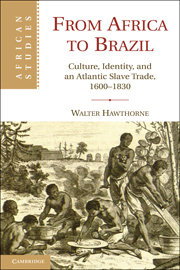Book contents
- Frontmatter
- Contents
- List of Figures
- List of Maps
- List of Tables
- Abbreviations Used in Notes
- Acknowledgments
- Introduction
- PART I THE WHY AND HOW OF ENSLAVEMENT AND TRANSPORTATION
- PART II CULTURAL CHANGE AND CONTINUITY
- 4 Labor over “Brown” Rice
- 5 Violence, Sex, and the Family
- 6 Spiritual Beliefs
- Conclusion
- Index
- References
6 - Spiritual Beliefs
Published online by Cambridge University Press: 05 September 2012
- Frontmatter
- Contents
- List of Figures
- List of Maps
- List of Tables
- Abbreviations Used in Notes
- Acknowledgments
- Introduction
- PART I THE WHY AND HOW OF ENSLAVEMENT AND TRANSPORTATION
- PART II CULTURAL CHANGE AND CONTINUITY
- 4 Labor over “Brown” Rice
- 5 Violence, Sex, and the Family
- 6 Spiritual Beliefs
- Conclusion
- Index
- References
Summary
In Grão Pará and Maranhão in the 1760s, a thirty-year-old slave named Joze, who was a Mandinka from Upper Guinea, used what locals called feitiçaria, or “magic,” to cure many people. Fearing that his actions were sinful, some of Joze’s neighbors reported him to a Portuguese representative of the Inquisition, who was visiting the captaincy. One of Joze’s clients, someone told the inquisitor, was a black female slave named Maria, who was a Bijago from Upper Guinea. Joze had been summoned to Maria’s side because she was “gravely ill, expelling from her vagina various vermin and animated parasites.” When Joze arrived, he examined one of the vermin and said that “she still had some inside her.” He then “spoke words” that no one in the room was able to understand and “with some herbs that he had secretly taken with him and water that he took from a pot, he made a soup without allowing anyone to watch.” Joze gave some of it to Maria who drank it while he again spoke “words that no one understood.” He returned later having prepared another medicine in secret and then made more the following morning and afternoon, “each time saying words that no one understood.” After having given her the last of his herbal soup, Joze took an ear of corn and a hoe and handed them to Maria, saying the corn should be buried in the yard. After some time, Maria expelled more vermin from her vagina – all contained in a “thing like a sack,” which looked like a bladder made of skin. The vermin were said to have resembled a small alligator, small hairy lizard, and small frog – each a different color.
- Type
- Chapter
- Information
- From Africa to BrazilCulture, Identity, and an Atlantic Slave Trade, 1600–1830, pp. 208 - 247Publisher: Cambridge University PressPrint publication year: 2010

